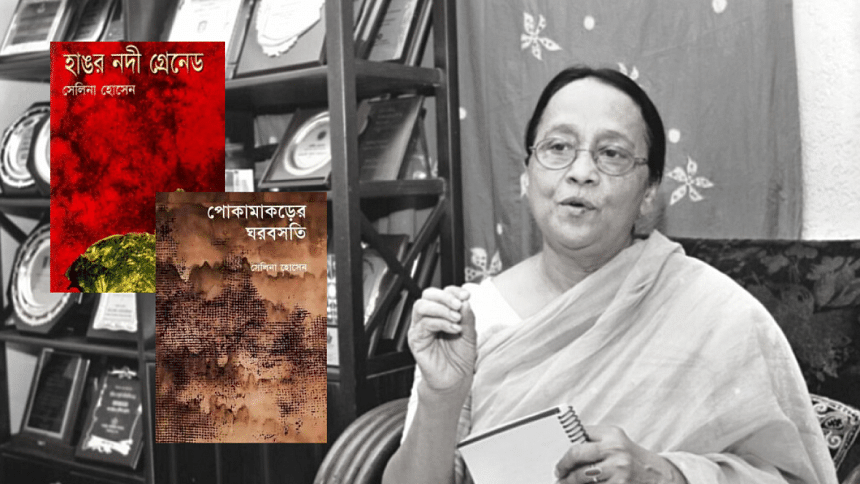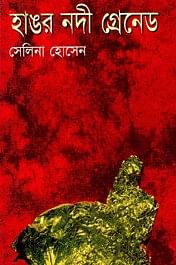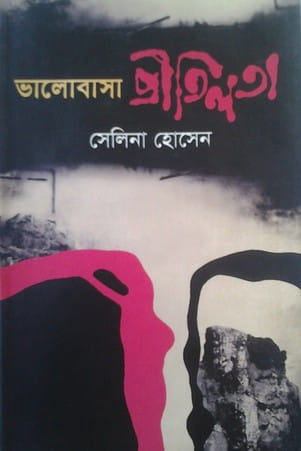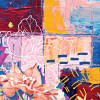Women in Translation Month: Why we need more of Selina Hossain

There is power in the written word, as they have said for centuries. In the contemporary world, however, where learning about other cultures and foreign ideas is such a sought after endeavour, more power lies in the art of translation. Be it a film in a foreign language, subtitled or dubbed in the local language of global viewers, or books and essays translated the same way—ideas travel faster if they are allowed to reach out across languages. Such is the significance of August's women in translation month.
A living legend, in the world of books and authors in Bangladesh, is undoubtedly Selina Hossain. Having won national awards, accolades, and scholarships, Hossain is definitely an author who should be read more, spoken about more and also, translated more. For generations, Selina Hossain's novels have been eye openers for many, not only in Bangladesh, but beyond. Her strong-willed characters, mainly the female characters, have broken barriers, much to the shock of readers in Bangladesh. Her stories highlight a mother, secretly a dreamer, or the young student announcing her love for the young muktijoddha. Her books have played a huge role in making an impact on an otherwise rigid mind-set in the country. She believes in developing changes, no matter how small they might be.
Selina Hossain's major works, Hangor Nodi Grenade (1976) and Poka Makorer Ghor Boshoti (1996) are powerful, award-winning novels that led her to be translated into many languages, namely English, Russian, French, Japanese, Korean, Finnish and Malay. Such literary prowess has earned her all the major national awards that are given to prolific authors and changemakers in Bangladesh—the Bangla Academy Award (1980), Ekushey Padak (2009), and the Independence Day Award (2018).

In an interview with The Daily Star in 2018, she said, "I was of course delighted and also very surprised! However, I felt ecstatic when my friend Ms Rowshan exclaimed that I had actually won this award for all the women in Bangladesh." The prestigious Independence Day Award, better known as the Shwadhinata Padak, was given to her for her contribution to literature. Many, including herself, believed that the award was also given to her to recognise women in our society, who are the achievers and the positive changemakers and forever on a journey to improve society.
Not only is Selina Hossain a prolific writer who makes stories from both the contemporary and the Liberation War era come alive, but she also talks profusely about the women of Bangladesh, who are still showcased as weak damsels in distress in present-day literature and on screen. Hossain's stories, instead, bring out the unsung heroines, the strength of the Bangladeshi women seldom explored in contemporary Bangladeshi art or media. This is why her books and her writings should be shared more widely on the global platform through translation, so as to spread these unspoken tales of our female change makers across the world.
When I think about the stories that deserve to reach a global audience, I cannot help but remember the famous scene in her novel, Hangor Nodi Grenade, where a mother gives away her autistic son to Pakistani soldiers, in turn saving the lives of muktijoddhas. Indeed this had shocked everyone. While some were echoing their sentiments along with the mother, who dreamed of a new Bangladesh, many were appalled at the fact that Hossain could actually conceive the idea of murdering an autistic teenager.
In her 2018 interview, Hossain shared, "I would get letters every other week about this back then! In fact, the novel touched so many hearts, the famous filmmaker Satyajit Ray wanted to turn it into a film. I still have the three letters that he had sent me. However, after Bangabandhu died, circumstances had changed and the film was never made by Ray." The film was eventually made by the famous Bangladeshi filmmaker and producer Chashi Nazrul Islam. It was shown at a festival in Delhi.
Then there is her 2018 novel, Shaatei Marcher Bikel (The Evening of March 7), which showcases Renu watching one of the major events in the history of Bangladesh unfold right in front of her. Selina Hossain herself was in her early 20s back then. A revolution was unfolding in front of her, and she channeled the character of Renu through herself and her experiences of the pre-war session and what came about afterwards.

Very soon, yet another book of Selina Hossain's will be turned into a film by Pradip Ghosh—her 1992 novel Bhalobasha Pritilata, where the legendary character of Pritilata Waddedar will be played by Nusrat Imrose Tisha. The portrayal of Pritilata, the young woman who, under the leadership of MasterDa Surya Sen, achieving the impossible, fighting for what's right, claiming back her own land and people from the British colonisers—is very much a global idea that needs to be shared and put out there for the world to experience.
The women in Selina Hossain's books are strong, because the author herself likes to be inspired by the reality around her. How else would this inspiration be shared with the world, without the power of translation?
Elita Karim is a journalist, musician, and editor of Star Arts & Entertainment and Star Youth, The Daily Star. She tweets @elitakarim.
For more book related news and views, follow Daily Star Books on Facebook, Instagram, Twitter, and LinkedIn.

 For all latest news, follow The Daily Star's Google News channel.
For all latest news, follow The Daily Star's Google News channel. 








Comments